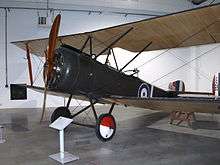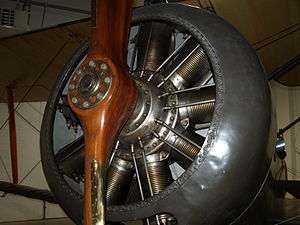Clerget 9B
The Clerget 9B was a nine-cylinder rotary aircraft engine of the World War I era designed by Pierre Clerget. Manufactured in both France and Great Britain (Gwynnes Limited), it was used on such aircraft as the Sopwith Camel. The Clerget 9Bf was an increased stroke version.[2]
| 9B | |
|---|---|
| Preserved Clerget 9B engine on display at the Fleet Air Arm Museum, RNAS Yeovilton. | |
| Type | Rotary engine |
| National origin | France |
| Manufacturer | Clerget-Blin |
| First run | 1913 |
| Major applications | Sopwith Camel |
| Number built | 3,650 (British production) |
| Unit cost | £907.50 (1915)[1] |
| Developed into | Bentley BR1 |
Variants
- Clerget 9B
(1913) 130 hp (97 kW). 1,300 produced by Ruston Proctor & Co Ltd of Lincoln
- Clerget 9Bf
(1915) 140 hp (104 kW). Extended stroke (172 mm (6.75 in)) version, increasing capacity to 17.5 L (1,066.5 cu in). 1,750 produced by Gwynnes Limited and 600 produced by Ruston Proctor.
Applications
Clerget 9B

- Armstrong Whitworth F.K.10
- Avro 504
- Avro 531
- Bristol M.1
- Cierva C.6
- Cierva C.8
- Fairey Hamble Baby
- FBA Type C
- Nieuport 12
- Nieuport 17bis
- Sopwith Baby
- Sopwith Camel
- Sopwith Scooter
- Sopwith Triplane
- Sopwith 1½ Strutter
Clerget 9Bf
Engines on display
- A preserved Clerget 9B engine is on public display at the Fleet Air Arm Museum, RNAS Yeovilton.
- A Clerget 9Bf engine is on display at the Powerhouse Museum, Sydney.[3]
- A Clerget 9B is on display at the Pima Air & Space Museum in Arizona.
Operational (Airworthy) Rotary Engines
The Shuttleworth Collection based at Old Warden Aerodrome, UK, operate an airworthy late production Sopwith Triplane (G-BOCK)[4] fitted with an original 9B as well as an airworthy late production Sopwith Camel (G-BZSC)[5] fitted with an original long-stroke 9Bf. These aircraft can be seen displaying at home air displays through the summer months.
Specifications (Clerget 9B)

General characteristics
- Type: Nine-cylinder air-cooled rotary engine
- Bore: 120 mm (4.72 in)
- Stroke: 9B: 160 mm (6.30 in), 9Bf: 172 mm (6.77 in)
- Displacement: 9B: 16.29 l (994.08 cu in), 9Bf: 17.5 l (1,067.92 cu in)
- Length: 920 mm (36.22 in)
- Diameter: 9B: 1,020 mm (40.15 in), 9Bf: 1,030 mm (40.55 in)
- Dry weight: 173 kg (381 lb)
Components
- Valvetrain: Single inlet and exhaust valves operated by pushrods and rockers
- Fuel system: Bloctube carburettor
- Fuel type: Gasoline mixed with Castor oil lubricant
- Oil system: Castor oil mixed with fuel
- Cooling system: Air-cooled
Performance
- Power output: 9B: 96.94 kW (130 hp) at 1,250 rpm, 9Bf: 104.40 kW (140 hp) at 1,250 rpm
- Specific power: 9B: 0.1308 hp/cu in (5.953 kW/l), 9Bf: 0.131 hp/cu in (5.966 kW/l)
- Compression ratio: 9B: 4.56:1, 9Bf: 5.3:1
- Specific fuel consumption: 9B: 0.564 l/kW/hour(0.74 pt/hp/hour), 9Bf: 0.45 l/kW/hour(0.59 pt/hp/hour)
- Oil consumption: 9B: 0.0686 l/kW/hour (0.09 pt/hp/hour), 9Bf: 0.0838 l/kW/hour (0.11 pt/hp/hour)
- Power-to-weight ratio: 9B: 0.563 kW/kg (0.341 hp/lb), 9Bf: 0.556 kW/kg (0.337 hp/lb)
See also
Related development
Comparable engines
Related lists
References
| Wikimedia Commons has media related to Clerget 9B. |
Notes
- Gunston 1989, p. 41.
- Lumsden 2003, p. 133.
- Powerhouse Museum - Clerget 9Bf Retrieved: 12 November 2010.
- The Shuttleworth Collection - Sopwith Triplane Retrieved: 21 August 2018
- The Shuttleworth Collection - Sopwith Camel Retrieved: 21 August 2018
- Grey, C.G. (1969). Jane's All the World's Aircraft 1919 (Facsimile ed.). David & Charles (Publishing) Limited. pp. 1b to 145b. ISBN 978-0-7153-4647-1.
Bibliography
- Gunston, Bill. World Encyclopaedia of Aero Engines. Cambridge, England. Patrick Stephens Limited, 1989. ISBN 978-1-85260-163-8
- Lumsden, Alec. British Piston Engines and their Aircraft. Marlborough, Wiltshire: Airlife Publishing, 2003. ISBN 978-1-85310-294-3.
- Grey, C.G. (1969). Jane's All the World's Aircraft 1919 (Facsimile ed.). David & Charles (Publishing) Limited. pp. 1b to 145b. ISBN 978-0-7153-4647-1.